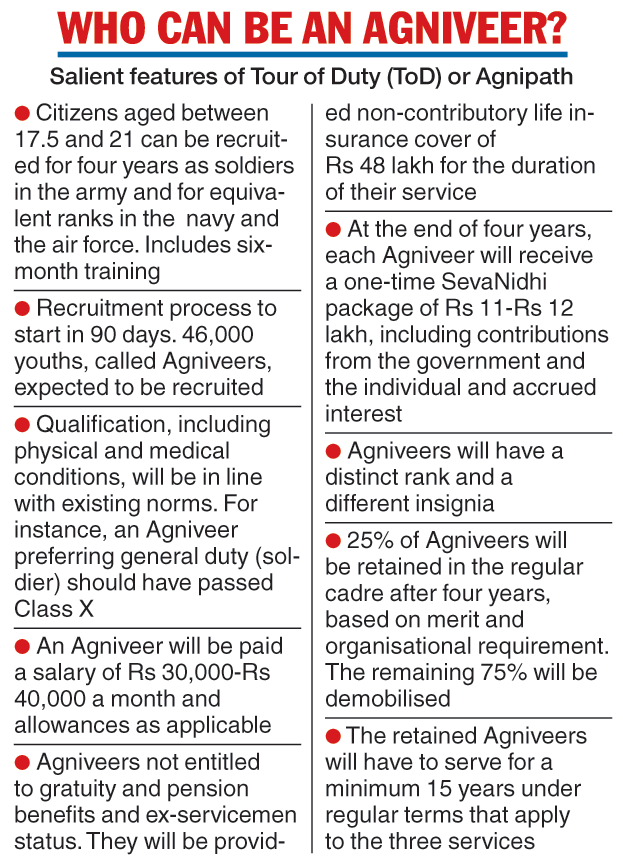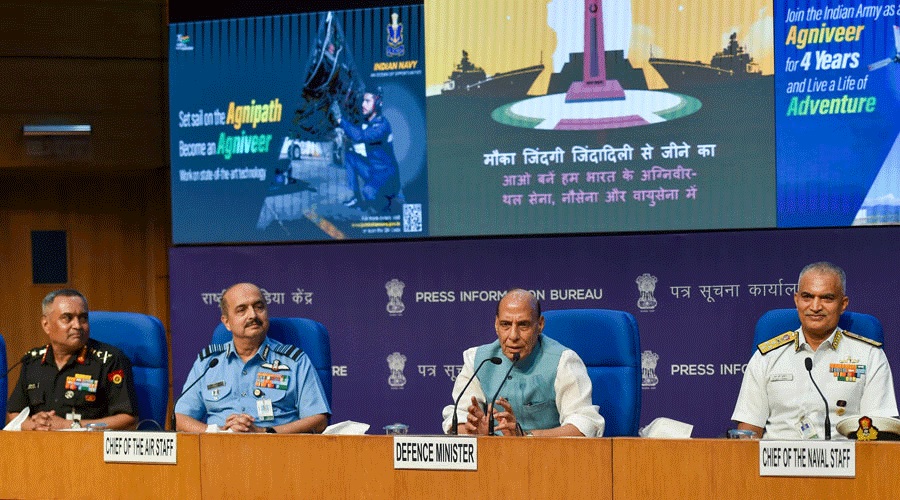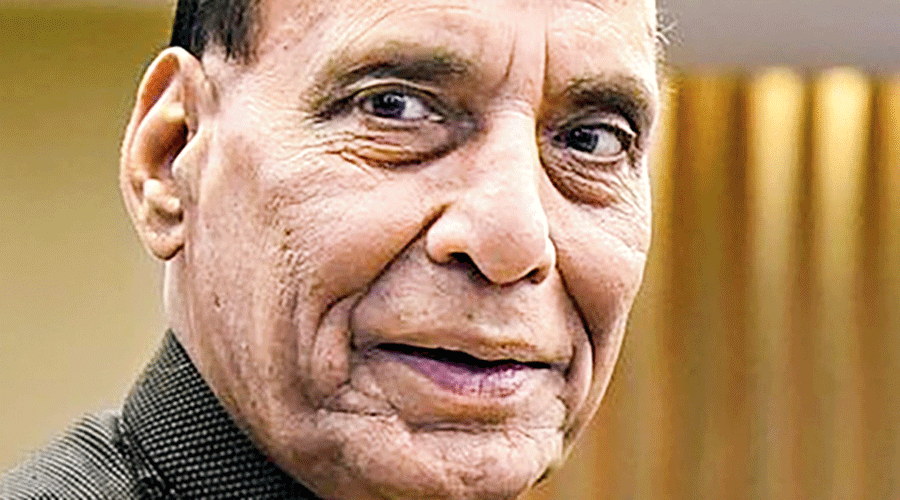The Narendra Modi government on Tuesday announced a scheme called Tour of Duty (ToD) a.k.a Agnipath, which shares its name with an Amitabh Bachchan movie of 1990 that eventually attained cult status, to allow youths to join the armed forces as soldiers known as Agniveers for just four years.
The principal objectives of the scheme that will put in place distinct ranks and insignia appear to be dousing the anger of jobless youths and easing the backbreaking burden of salary and pension on the defence budget.
But military veterans expressed the fear that the short tenure could sound the “death knell for the armed forces”, saying it could adversely impact the military ethos and professionalism.
One veteran, Birender Dhanoa, tweeted: “Professional militaries, usually, don’t run employment schemes….”
Other veterans cited multiple concerns:
⚫ A possible “militarisation” of society.
Law-and-order problems could arise as a vast majority of recruits trained in the use of weapons would return to an ecosystem of shrivelled job opportunities after the end of their stint in the forces. Till now, a fit general-duty soldier had to serve 10-15 years.
⚫ The possibility of a “kindergarten army” of inadequately trained personnel incapable of meeting the challenges posed by hostile neighbouring countries. The training period so far has been one year. ToD recruits will be eligible for deployment as combatants in key forward locations and there will be no restrictions in their roles.
⚫ The risk of disrupting the age-old regimental structure of the armed forces.
The Agnipath scheme was announced by defence minister Rajnath Singh and the three service chiefs on Tuesday shortly after it was cleared by the cabinet committee on security headed by Prime Minister Modi.
“The infusion of disciplined, motivated and skilled Agniveers back into the society after military service would be a great asset for the nation as it would be a win-win proposition,” the defence minister said.
Government sources said the project was aimed at cutting the ballooning salary and pension bills.
“Under the scheme, the government will save on pensions and other allowances. There will be no requirement of attractive severance packages, ex-servicemen status and contributory health scheme for the Agniveers,” said a defence ministry official.
Several veterans castigated the government’s decision.
“Death knell for armed forces. ToD not tested. NO pilot project, straight implementation. Will also lead to Militarisation of society, nearly 40,000 (75 per cent) youth year on year back rejected & dejected without a job, semi trained in arms ex Agniveers. Not a good idea. No one gains,” former director-general of military operations Lt Gen. Vinod Bhatia tweeted.
Lt Gen. P.R. Shankar, former director-general, artillery, referred to the project as a “kindergarten army”. He said the scheme “does not seem to be a good idea” and advocated the need for caution.
“Tour of Duty is an exercise being undertaken without adequate staff or capacity, in order to create which, the teeth have to be knocked off. Then, the not so well trained tourist will be part of a subunit in which there is a rat race for retention with no bonding or no junior leadership,” Shankar wrote in an article.
“This soldier will be expected to man Brahmos/Pinaka/Vajra weapon system which he cannot handle and defend his gun position from marauding Pakistanis or Chinese. In essence, the tour of duty proposal expects a superman from a kindergarten. We might be producing an Abhimanyu but he will not get out of the Chakravyuhu.”
A retired lieutenant general told The Telegraph: “It is unfortunate that those who have taken this uncalled for decision to introduce the ToD have no idea of the military’s ethos. None of them, nor their children, has ever served in the armed forces.”
He said that considering the joblessness in the country, thousands of Agniveers, after serving in the armed forces for four years and having been trained in the use of weapons, could create a different kind of internal security problem.

In his article, Shankar recalled that when he was a brigade commander in the east, locals used to approach him to train tribal boys so that they could be recruited in the army.
“I was very enthusiastic. I chalked out a programme and was about to commence training. The Subedar Major of my Assam Rifles battalion came up to me when I went to the unit and told me ‘Sahab, do you realise that all the boys whom you train and who do not get recruited will be picked up by militant groups? You might be training future militants’. I quietly buried the programme,” he wrote.
Terms and conditions
Enrolment will be done through an online centralised system for all three services with specialised rallies and campus interviews from recognised technical institutes such as Industrial Training Institutes, among others. Enrolment will be based on “All India All Class” basis, the government said.
A defence ministry statement said the scheme would enhance the “youthful profile of the armed forces and provide a fresh lease of josh (spirit) and jazba (passion)”, while at the same time bring about a transformational shift towards a more tech-savvy armed forces, as needed today.
“The dividends of a short military service to the nation, society and the youth of the nation are immense. This includes inculcation of patriotism, team work, enhancement of physical fitness, ingrained loyalty for the country and availability of trained personnel to boost national security in times of external threats, internal threats and natural disasters,” the statement said.
The sources said the scheme aimed to tap the “resurgence of nationalism and patriotism” among youths who do not want to join the armed forces as a profession but wish to experience the military life for some time.
With no recruitment taking place for nearly two years now in the military, there has been considerable anxiety among the youth. Protests have been held in Haryana and Punjab over the delay.
A retired colonel questioned the logic behind the Agnipath scheme. “The country is facing a huge unemployment problem and the ToD is never going to be a solution. Selection criteria in the armed forces are never based on patriotism and nationalism,” he said.
Chiefs’ view
During the joint media briefing, army chief General Manoj Pande said the new process would herald a paradigm shift in the recruitment process and necessitate changes in the way “we impart training to our recruits and soldiers in enhancing their combat potential”.
He said there would be “no compromise” on physical, medical and professional standards and parameters. “I want to assure you that during the implementation and stabilisation of the Agnipath scheme, the army’s operational capabilities and preparedness along the borders and the ability to deal with internal security challenges will be fully maintained,” he said.
He said the army would “institute a fair, transparent and scientific method in screening the initial intake for four years and applying similar yardsticks to select those who will get re-enrolled”.
Asked about the fears of veterans that the scheme would lead to the loss of the regimental structure, Gen. Pande said: “The regimental structure will continue. The Agniveers will be assimilated in the organisation and we will maintain the ethos.”
He said the scheme aimed to make the army a future-ready fighting force, capable of meeting multiple challenges across the full spectrum of conflict.
Navy chief Admiral R. Hari Kumar said women would also be inducted into the armed forces under the new scheme. Sources in the defence ministry, however, said the recruitment of women under the scheme would depend on the needs of the respective services.
Air Chief Marshal V.R. Chaudhari said the IAF was looking to use dynamic young people and would train and expose them to a high-tech environment and hone their skills for future employment. “The new scheme, therefore, gives the IAF an opportunity to draw from the vast pool of talent in the country,” he said.
He underscored that those recruited would be job-ready after four years in the indigenous industry and civil society.












